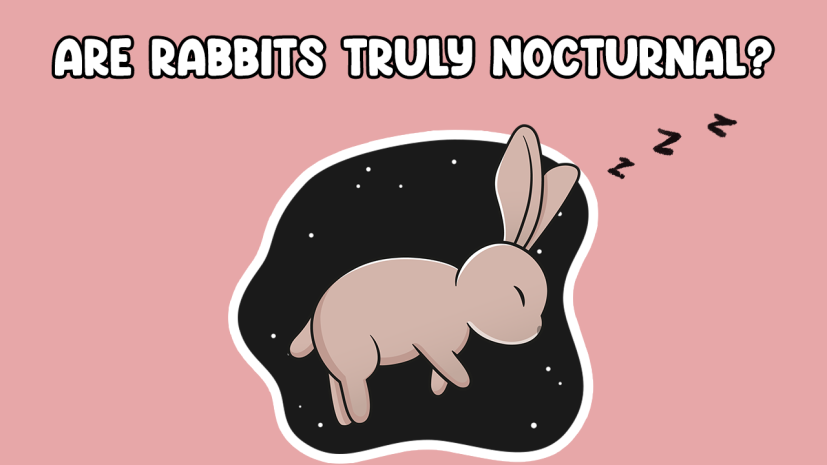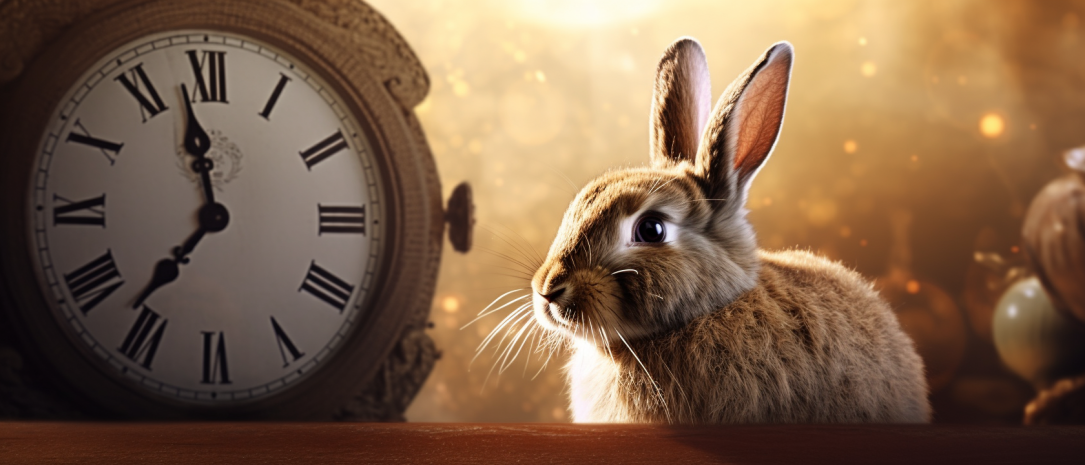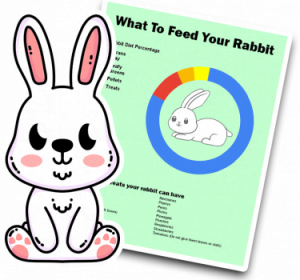
If you’ve got an indoor rabbit, you may have noticed they sleep during the day or, at the very least, kick their legs out and relax. A particular myth among rabbits is that they are nocturnal, but are they?
Rabbits are not nocturnal. They will sleep regularly during the day and periods in the middle of the night. So, when do rabbits sleep? As rabbits are Crepuscular, they mostly get up and move around sunrise and sunset.
We find our indoor domestic rabbit Link wakes up at around 4.30 AM – 5 AM, does zoomies almost every morning, and ends the evening with him sleeping at the end of our bed for around an hour before we get up. Your rabbit’s internal clock has much to contribute to its energy levels throughout the day.

When an animal is described as crepuscular, it is most active during the twilight hours of dawn and dusk. These animals have adapted their behavior to take advantage of the unique opportunities presented during these times when the light levels are neither too bright nor too dark.
Crepuscular animals, like rabbits, engage in various activities during these hours, such as foraging for food, socializing with others, mating, and avoiding predators. Being active during these transitional periods is a natural part of their evolutionary route.
Although crepuscular animals are not strictly nocturnal (active at night) or diurnal (active during the day), they sleep at night. However, they also sleep during the day, differentiating them from diurnal animals. This behavior allows them to strike a balance between rest and activity.
While crepuscular animals are most active during dawn and dusk, it is not uncommon for them to have periods of activity during daylight or darkness. They typically won’t sleep throughout the entire day or night. You might occasionally see these animals foraging during the day, but observing their increased activity in the morning and evening is much more common.

Domestic rabbits exhibit crepuscular behavior due to their evolutionary heritage and the need to adapt to their surroundings. The crepuscular nature of wild rabbits can be attributed to their strategies for predator avoidance.
Owls, being nocturnal hunters, pose a threat at night, while diurnal predators like hawks and eagles are dangerous during the day when their visibility is limited.
By being crepuscular, rabbits can take advantage of the twilight hours when these predators are less active or transitioning between hunting periods, reducing the risk of encountering them. This behavior has been ingrained in their instincts over time.
Furthermore, environmental factors can also influence the crepuscular habits of rabbits. For instance, in countries like Australia, with its significant feral rabbit population, the heat during the day can be intense. To avoid extreme temperatures, rabbits may become more active during the cooler dawn and dusk hours.
This adaptation allows them to forage for food and engage in essential activities while minimizing heat stress. The ability to adjust their activity patterns based on environmental conditions further emphasizes their crepuscular tendencies.

In our experience, our domestic rabbit’s internal body clock isn’t the same as a wild rabbit’s but does appear to be based loosely around it. At around 5 am, we will be woken up by our rabbit jumping on us, resulting in him sitting or sleeping at the end of the bed after he’s done with his excitement.
He will then follow us into his room, beg for pellets or treats, and usually play with his toys. This means our rabbit has adapted to our lifestyle and will often sleep when we’re working during the day and then become more active before and after work.
Each rabbit’s internal body clock will be different, but generally speaking, this is an excellent basis for your rabbit:
Your rabbit will control the sleep they get, which usually means you don’t need to worry. That said, it can vary between a few hours to a full 9-10 hours of sleep, depending on their environment.
We typically find that our rabbit will sleep lots of small bursts throughout the day unless he’s feeling incredibly relaxed and will sleep in whatever position he finds most comfortable or safest.
During the night, your rabbit will typically engage in relaxation, eating, drinking, and intermittent napping. Providing them with a stimulating environment is important by incorporating toys and activities within their enclosure.
This helps to keep them mentally and physically engaged during their nocturnal hours. Additionally, ensuring that their enclosure has sufficient size can help prevent behaviors like rattling bars or restlessness.
If possible, allowing them free-roam access is an excellent solution for fostering bonding, trust, and mitigating any potential issues related to confinement.

By entering your email address you agree to receive emails from Cottontailclub. We'll respect your privacy and you can unsubscribe at any time.